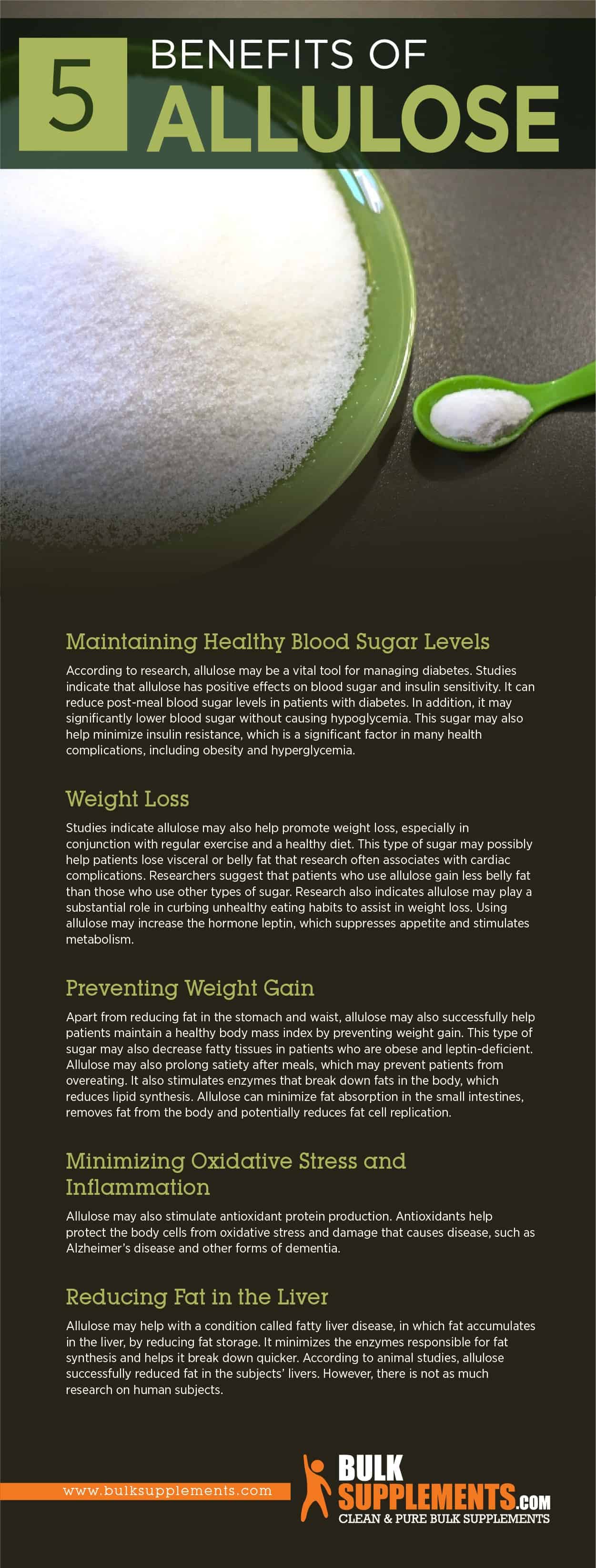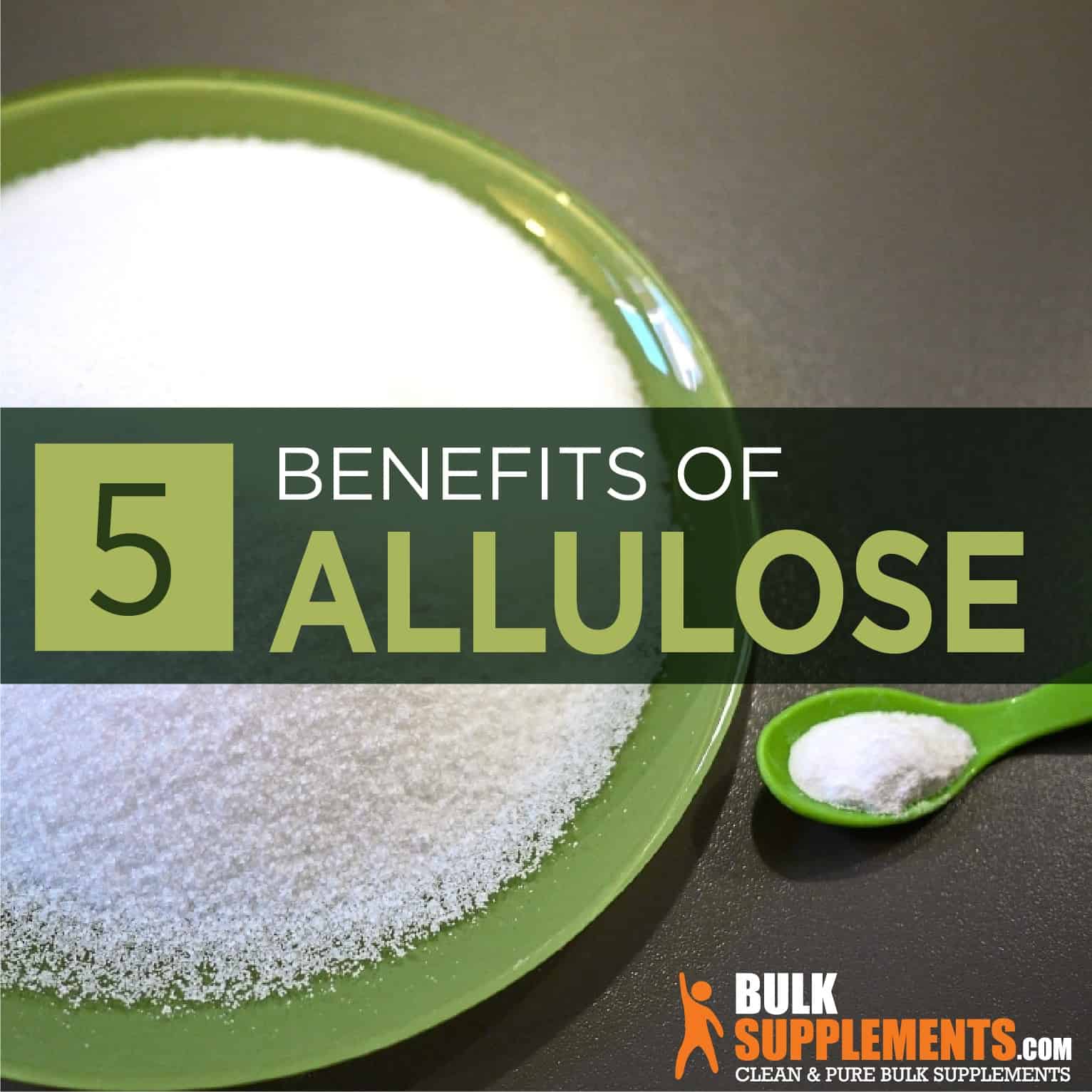Updated: 11/13/23
Are you looking for an all-natural, low-calorie sugar substitute to sweeten your foods and beverages that won’t pack on the pounds? If so, then look no further than allulose. Allulose is a rare form of sugar produced naturally by certain types of fruits and grains that has a sweetness similar to table sugar yet only one-tenth of its calories. As a bonus, it does not raise blood glucose levels like other sugars do, which makes it great for diabetics. Read on to learn more about this amazing natural alternative to traditional white sugar!
What is Allulose?
Allulose is a type of sugar that is naturally present in fruit, similar to fructose. It is a low calorie, low glycemic index sweetener that tastes exactly like sugar but is only a third of its calorie count. It is naturally found in many food items like raisins, figs, and maple syrup. Allulose does not impact blood sugar levels, making it a healthy alternative for people with diabetes or those who are concerned with their glycemic index levels. It is also a prebiotic, which means it helps feed the good bacteria in your gut and do wonders for your digestive system.
For those of you that are sensitive to sugar, allulose is here to make your life easier. Allulose has approximately 70% of the sweetness of sugar, but without the harmful effects. This alternative sweetener is safe for consumption by those with gluten allergies and has no known allergens. It also complies with the ketogenic, paleo, and vegan diets, making it a versatile ingredient for all types of food recipes.
Research indicates sugar plays a significant role in various health complications, such as obesity, which research associates with heart disease, diabetes and high cholesterol. Substituting sugar with allulose may patients maintain a healthy body weight and support overall health.
Monosaccharides vs. Polysaccharides
Like carbohydrates, the body breaks down sugar to generate energy. Oxygen, hydrogen and carbon build up carbohydrates. Monosaccharides are simple carbohydrates with a single unit of sugar. Disaccharides contain two units, while polysaccharides have three or more. Polysaccharides are also more common in nature than monosaccharides.
One distinct difference between monosaccharides and polysaccharides is that monosaccharides do not hydrolyze further, but polysaccharides do because they contain more than two units of sugar. In addition, monosaccharides are sweeter than polysaccharides and they are colorless with a crystalline appearance. On the other hand, polysaccharides are not sweet at all and insoluble in water, but monosaccharides are water-soluble.
Polysaccharides can also provide our bodies with prebiotics, which can help improve digestion and bowel movement. Prebiotics are excellent at nourishing the helpful bacteria that live in our gut, and in turn, they provide a wealth of health benefits. Eating foods high in polysaccharides can also help reduce the risk of chronic diseases. They can reduce harmful LDL cholesterol levels, help manage diabetes, and reduce the risk of certain cancers.
Benefits of Allulose
Allulose is taking the health world by storm. Let’s explore the numerous benefits of allulose, from weight loss to controlling diabetes, and why it’s a must-add to your daily diet.
Low Caloric Value
Allulose is a naturally occurring sugar found in fruits like figs, raisins, and kiwi. Unlike common table sugar, it has only 10% of the caloric value. Therefore, switching to allulose means you can indulge in your favorite desserts without adding extra calories to your daily diet. Also, it’s considered safe by the FDA.
Supports Weight Loss
Who wouldn’t like a sugar that helps shed some pounds? Allulose aids in weight loss due to its low-calorie count and impact on insulin resistance. It also suppresses hunger hormones, leaving you feeling fuller for longer periods after meals and reducing the need for constant snacking on unhealthy foods.
Preventing Weight Gain
Apart from reducing fat in the stomach and waist, allulose may also successfully help patients maintain a healthy body mass index by preventing weight gain. This type of sugar may also decrease fatty tissues in patients who are obese and leptin-deficient. Allulose may also prolong satiety after meals, which may prevent patients from overeating. It also stimulates enzymes that break down fats in the body, which reduces lipid synthesis. Allulose can minimize fat absorption in the small intestines, removes fat from the body and potentially reduces fat cell replication.
Reduce Risk of Heart Disease
Heart disease is one of the leading causes of death worldwide. Allulose’s low-calorie nature, lack of impact on glucose, and gut health-promoting properties may help reduce the risk of heart disease. Studies show that allulose may reduce high triglyceride levels, which is a significant risk factor for heart disease.
Gut Health
Allulose has shown positive effects on improving gut health by regulating the good bacteria present in the gut. It helps combat diseases by impeding the growth of harmful bacteria present in the body.
Dental Health
We all know that sugar is the primary cause of tooth decay. Since allulose doesn’t stick to teeth, it doesn’t provide a breeding ground for bacteria meaning lower chances of developing tooth cavities.
Maintaining Healthy Blood Sugar Levels
According to research, allulose may be a vital tool for managing diabetes. Studies indicate that allulose has positive effects on blood sugar and insulin sensitivity. It can reduce post-meal blood sugar levels in patients with diabetes. In addition, it may significantly lower blood sugar without causing hypoglycemia. This sugar may also help minimize insulin resistance, which is a significant factor in many health complications, including obesity and hyperglycemia).
Minimizing Oxidative Stress and Inflammation
Allulose may also stimulate antioxidant protein production. Antioxidants help protect the body cells from oxidative stress and damage that causes disease, such as Alzheimer’s disease and other forms of dementia.
Reducing Fat in the Liver
Allulose may help with a condition called fatty liver disease, in which fat accumulates in the liver, by reducing fat storage. It minimizes the enzymes responsible for fat synthesis and helps it break down quicker. According to animal studies, allulose successfully reduced fat in the subjects’ livers. However, there is not as much research on human subjects.

Side Effects of Allulose
Researchers claim that allulose is safe for moderate consumption. However, like any supplement, it is possible for it to cause side effects. But if they do occur, they are usually mild. Some of the side effects allulose may cause include:
Gastrointestinal Issues
One of the most common side effects of allulose is gastrointestinal distress. While the exact cause of this is still unknown, many people report experiencing bloating, gas, and diarrhea after consuming high amounts of allulose. However, it’s worth noting that everyone’s body reacts differently, so some people may not experience any side effects at all.
Allergic Reactions
In rare cases, some people may have an allergic reaction to allulose. Symptoms can include rashes, hives, and difficulty breathing. If you suspect you’re having an allergic reaction to allulose, seek medical attention right away.
Headaches
Headaches are another potential side effect of allulose, although they are less common than gastrointestinal distress. If you’re prone to headaches, or have experienced headaches after consuming other sugar substitutes, allulose might not be the best option for you.
Insomnia
Allulose can also impact your sleep habits. Because it’s a type of sugar, allulose can increase energy levels and keep you awake at night. While this may not be a significant issue for some people, those who are sensitive to caffeine or have trouble sleeping should be mindful of their allulose intake.
Lower Blood Sugar Levels
While not technically a side effect, it’s essential to note that allulose can lower blood sugar levels – especially in those with diabetes. While this is generally seen as a positive since it can reduce the risk of high blood sugar, it’s still important to monitor your levels and speak with a medical professional about the appropriate Allulose intake for your medical needs.
Why Take Allulose Supplements?
Patients may be able to use allulose as a substitute for sugar in conventional foods and drinks. However, its effects on humans may be limited so it’s important to speak with a doctor before using this supplement or any other. A physician will be able to give accurate advice regarding safety and will be able to confirm a safe dosage.
Allulose may be an adequate substitution for different types of sugar and it may be a healthier alternative. Research claims that it has fewer calories, prevents cravings, may not interfere with blood sugar and it is generally safe for human consumption. It may also be able to help users manage diabetes, control appetite and lose weight. Allulose is a natural compound in many different foods. Many food and drink manufacturers have utilized the potential of healthy sugar substitutes use allulose in their products instead of sugar.
Where Can You Find Allulose
Allulose is not yet as widely available as some other sweeteners, but it can be found in some health food stores and online. It’s usually sold as a granulated sweetener and can be used in baking, cooking, and as a sweetener for beverages like coffee. It’s also found in some products like protein bars and ice cream, where it’s used as a sugar substitute.
Want to know where you can buy Allulose? Look no further than BulkSupplements.com. They’re a well-known manufacturer and distributor of high-quality dietary supplements. Not only do they have a wide range of consumer products, but they also supply ingredients to other brands in the food and supplement industry. Rest assured, all products at BulkSupplements.com undergo rigorous manufacturing and testing processes. Ready to give Allulose a try? Reach out to BulkSupplements.com and place your order today!
The Bottom Line
Allulose is a natural type of sugar that may be an effective, healthier substitute for sugar. Many patients use this product because of its low glycemic index, which means it may have less of an effect on blood glucose and cholesterol levels than other types of sugar. This sugar substitute may also help improve metabolism and reduce fat storage in the liver that can cause permanent liver damage. Researchers claim that it can stimulate insulin release, which may make it a healthy option for patients with diabetes. It does not raise blood sugar or cause hyperglycemia. Also, allulose may be able to act as an antioxidant and effectively reduce oxidative stress that causes damage in the body.
Many food manufacturers add allulose to their products as a substitute for other types of sugar. Patients may also use it as a supplement and add it to their own meals or drinks. However, allulose is not a cure for any medical condition and patients should only use it with a doctor’s approval. It may cause side effects, but it is generally a safe product in appropriate doses.
In a world where sugar is present in so many foods, finding healthy alternatives is crucial for our overall health. It is an excellent choice for people who want to enjoy the sweet taste without worrying about the calories. With its numerous health benefits such as managing blood sugar, promoting gut health, and providing a great taste, allulose is a versatile sweetener that’s perfect for people with various dietary requirements. Adding allulose to your diet is a great step towards a healthier, happier you.
These statements have not been evaluated by the Food and Drug Administration. These products are not intended to diagnose, treat, cure or prevent any disease


